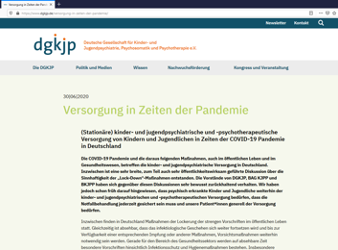The Covid-19 pandemic and child and adolescent psychiatric service in Germany – acute challenges and the need to consider long-lasting effects for mental health service for children
By Michael Kölch, Renate Schepker, Hans-Henning Flechtner for the German Society of Child and Adolescent Psychiatry, Psychosomatics and Psychotherapy

The measures adopted by the German government to reduce the spread of SARS-CoV-2 (Covid-19) infections led to a “lockdown” of different systems impacting everyday life in many ways since March 2020. In May, the re-opening of shops, restaurants etc. started and social life awakened again.
Of great importance for children has been the closing down of schools, combined with a new experience of “home-schooling”, which lasted mostly up to the summer holidays in July (the traditional end of a school year in Germany). Furthermore the strict reduction of social contacts and quarantine might be related to a decrease in mental well-being (Brooks, Webster et al, 2020). The background of the lockdown in Germany was the intention to flatten the curve of infections to prepare the medical system, especially hospitals, for potential severe Covid-19 patients by increasing capacities in intensive care units. Infections with Covid-19 virus had high variability in between regions in Germany. Federal states like North Rhine-Westphalia, Bavaria, Baden-Württemberg were burdened with high numbers of infections, whereas in the North East of Germany, the infection rates were low in spring 2020 and remained low up till now. The uncertainty of how infections spread and who is especially in danger to suffer from a serious infection made it necessary to have measures implemented in all Germany, even if regulations differed between the federal states.
The lockdown had impact on mental health services for children and adolescents in many ways. In general, there is a broad and well differentiated medical and youth welfare system for treatment and support of children and adolescents with mental disorders in Germany. It consists of more than 2,500 trained medical specialists for child and adolescent psychiatry with more than 1,200 within the German outpatient system. Roughly 150 specialized units with more than 6,300 beds for inpatient/day care treatment are run by hospitals plus 30 University clinics. All costs are covered by health insurance, so services are available for every family or child. Additionally, more than 6.000 specialized psychotherapists in outpatient care provide psychotherapy for children and adolescents which is reimbursed by health insurance. Specialized pediatric centers (Sozialpädiatrische Zentren, SPZ) provide diagnostics and therapy for children with complex disabilities including cognitive impairments and/or psychiatric symptoms. Child psychosomatic services are organized as well in pediatric as in child psychiatry units, and most of them are run by child psychiatrists.
Additionally, the youth welfare system provides support to families with counseling services and educational support up to residential homes for children with special needs. Under normal circumstances, services for children and adolescents with psychiatric disorders in Germany are organized in a very complex system where child and adolescent psychiatry intensively collaborates within the health care system as well as with schools and the youth welfare system.
The University Hospitals in Germany have additional foci next to service: research, teaching students, and training specialists. There are several large scale research projects funded by the German Ministry for Research and Education (BMBF) for children and adolescents with psychiatric disorders within a program called “heathy all the life” (Gesund ein Leben lang), addressing research on the assessment and therapy of ADHD, affective dysregulation and non-suicidal self-injuring behavior (NSSI). There is a major effort also by the German Society for Child and Adolescent Psychiatry to promote and support research within child and adolescent psychiatry, create evidence based assessments and treatments within the services and to improve prevention of mental disorders in children.
The pandemic’s effect on services, research and teaching
Due to the pandemic, child and adolescent psychiatry in Germany is facing enormous challenges. All institutions were affected by the Covid-19 related measures. Child and adolescent psychiatry departments had to guarantee adherence to hygienic standards (like contact restriction between patients, limitation of visitors) which could not be ensured in every instance.
Colleagues in practice had to organize personal protection material, like masks, disinfection sprays, gloves etc. Some colleagues have tested positive for Covid-19 and had to go in quarantine for at least two weeks. Clinics and departments for child and adolescent psychiatry became uncertain if day treatment was still appropriate, given the risk of infection due to the daily return of patients to their families. Some CAP facilities were shut down by their hospital CEOs, staff being relocated to support somatic units.
Distance regulations within inpatient units had to be established, but they have to be weighted against therapeutic aspects of social interaction. At some universities study participants were declared to be “elective patients”, and it wasn´t allowed to continue onsite study protocols, study personnel was ordered to work from their home office. Study recruitment in many studies stopped or studies were delayed. Several studies tried to reorganize face to face contacts into phone-contacts for study visits. During spring break, all universities organized online teaching, so in most cases at least online courses were available for medical and psychology students. In between, medical students were called to support the health administrative bodies, grossly understaffed in Germany.
In general, the number of inpatients in CAP departments was reduced, some departments providing only emergency treatment, especially in areas with high numbers of infections. Outpatient services had to be reorganized with phone contacts and successively with methods of telemedicine, like video chats via internet. According to the German Health Code this was formerly not allowed and general and legislative changes had to be implemented to make these approaches possible.
German Society for Child and Adolescent Psychiatry (DGKJP) during the pandemic
The German Society for Child and Adolescent Psychiatry provided support to colleagues, encouraged them to guarantee child and adolescent psychiatric treatment for patients during the lockdown period, and even after it. In some places strict regulations by local authorities sometimes had to be followed, but were inappropriate in CAP (e.g. no visitors in hospitals). Additionally the DGKJP was in close contact with the federal government structures to prevent severe economic consequences for hospitals due to the loss of patients and strive for reimbursement during the Covid-19 pandemic. Political activities took place in close collaboration with colleagues from two other child and adolescent alliances, the colleagues from BKJPP and BAG. The foundation of the three child and adolescent psychiatric societies and alliances “Achtung!Kinderseele”, which has a main focus in fighting stigmatization of mental illness in childhood, created an ad hoc campaign to support parents and children in homeschooling.
Unfortunately, two major DGKJP meetings, the biannually held research meeting (which addresses especially young researchers) in 2020 and the DGKJP congress in 2021 in Madgeburg had to be cancelled and postponed. The DGKJP board considered whether an online congress would be feasible and appropriate, but due to the high importance of networking, personal contacts and open debate characterizing all our meetings, the DGKJP board decided to postpone both meetings for one year. The research meeting is now planned for 2021 in March in Cologne and the DGKJP biannual congress is scheduled for May 2022 in Magdeburg. Additionally, DGKJP will intensify its engagement in online courses for trainees and state of the art online lectures within the next two years.
Effects of the pandemic in Germany on society
Due to school closures, supervision that school social workers provide for endangered children subsided. Other systems such as the youth welfare system for families and children with vulnerabilities – like children with mental disorders – were trying their best but outreach was missing. Therefore there was heightened risk for children living in families with high risk of maltreatment. First data from the German Medical Hotline for issues of Child Protection (Medizinische Kinderschutzhotline) indicate that there was a peak of physical maltreatment cases followed by an increase of suspected sexual abuse. Valid data is yet not available, but ongoing studies are underway. Additionally, there is a pressing need for studies in Germany about how in future pandemics the psychiatric health care system, youth welfare system, and also schools can better respond to keep in contact with vulnerable families and optimize treatment.
The pandemic has accelerated the provision of e-health services. This was a necessary change in the complex treatment of children with psychiatric disorders. Video psychotherapy sessions or phone contacts as a substitute for face to face meetings should be evaluated more closely in the future. Standards related to efficacy and evidence for these interventions, as well as attitudes of patients towards media-based psychotherapy, have to be developed in the future. There was a governmental plan to provide every school aged child from a disadvantaged family with a computer, yet the roll out has not been accomplished.
The pandemic has had short term consequences associated with lockdown, but it will have medium and long term consequences also for children and adolescents with psychiatric disorders, even in Germany. School related symptoms (e.g. school avoidance, social anxiety) may have taken a more chronic course due to homeschooling. Psychotic fears now may also include the virus. For patients suffering from autism, the pandemic may have been experienced as a big relief from complex social tasks.
There is a strong interdependence of mental disorders and being from a family of low socioeconomic status (SES) in Germany, which was shown by national surveys on (mental) health of children in Germany for more than one decade (Hölling, Schlack et al. 2014). Both have transgenerational effects which increase inequality and low levels of functioning of disadvantaged groups within societies (Plass-Christl, Haller et al. 2017). The economic recession caused by the Covid-19 pandemic may lead to increasing unemployment rates in Germany and more economic difficulties among families. Service capacities of the youth welfare system rely also on a positive economic situation in the community, as youth welfare is financed by the federal states. One promising factor in Germany is the existence of a strong and differentiated network of service providers for children and adolescents with psychiatric disorders. Additionally, several studies have been started or are planned to explore the impact of Covid-19 on mental health of children, on health care service utilisation and necessary compensations for families at risk.
It will be one of the prominent functions of child and adolescent psychiatry in Germany, to detect changes in mental health of youths, to claim the necessary support for disadvantaged children and families and to provide early intervention for all in need.
References
Brooks, S. K., Webster, R. K., Smith, L. E., Woodland, L., Wessely, S., Greenberg, N., & Rubin, G. J. (2020). The psychological impact of quarantine and how to reduce it: Rapid review of the evidence. The Lancet, 395(10227), pp. 912-920.
Hölling H, Schlack R, Petermann F, Ravens-Sieberer U, Mauz E, KiGGS Study Group (2014) Psychische Auffälligkeiten und psychosoziale Beeinträchtigungen bei Kindern und Jugendlichen im Alter von 3 bis 17 Jahren in Deutschland – Prävalenz und zeitliche Trends zu 2 Erhebungszeitpunkten (2003–2006 und 2009–2012). Ergebnisse der KiGGS-Studie – Erste Folgebefragung (KiGGS Welle 1) Bundesgesundheitsblatt – Gesundheitsforschung – Gesundheitsschutz 57(7)
Fegert, J M., Berthold O, Clemens V, Kölch M (2020) COVID-19-Pandemie: Kinderschutz ist systemrelevant Dtsch Arztebl 2020; 117(14): A-703 / B-596
Plass-Christl, A., Haller, A. C., Otto, C., Barkmann, C., Wiegand-Grefe, S., Hölling, H., Schulte-Markwort, M., Ravens-Sieberer, U., & Klasen, F. (2017). Parents with mental health problems and their children in a German population based sample: Results of the BELLA study. PloS one, 12(7), e0180410.
https://doi.org/10.1371/journal.pone.0180410

Woman helping boy with his face mask (© August de Richelieu from Pexels.com)

German Society of Child and Adolescent Psychiatry, Psychosomatics and Psychotherapy supported colleagues during the pandemic with information

